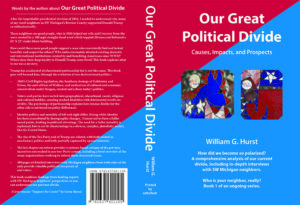On July 29, 2021, Bill Hurst, head of the FixUS Michigan State Chapter, and author of this book, gave a presentation on the book to a FixUS audience. Go here to see the presentation.
Words by the author about Our Great Political Divide
 After the improbable presidential election of 2016, I needed to understand why many of my rural neighbors in SW Michigan’s Berrien County supported Donald Trump so enthusiastically.
After the improbable presidential election of 2016, I needed to understand why many of my rural neighbors in SW Michigan’s Berrien County supported Donald Trump so enthusiastically.
These neighbors are good people, who in 2016 helped my wife and I recover from the mess created by a 100 mph straight-lined wind which toppled 28 trees and flattened a 62’ X 22’ cinder block building.
How could these same good people support Donald Trump, who attacked existing domestic and international institutions created by and benefiting Americans since WWII, and who violated so many norms needed in our democracy? Where does their deep loyalty to Donald Trump come from? This book explains what to me was a mystery.
Trump has accelerated dysfunctional partisanship but is not the cause. This book goes well beyond him, through the evolution of our dysfunctional politics:
- 1960’s Civil Rights legislation, the Southern strategy of Goldwater and Nixon, the anti-elitism of Wallace, and unification of cultural and economic conservatism under Reagan, created and echoes today’s politics.
- Voters and parties have sorted into geographical, educational, racial, religious and cultural bubbles, creating stacked identities with detrimental results on civility. The psychology of partisanship explains how intense dislike for the other side is not based on policy differences.
- Identity politics and morality of left and right differ. Rising white identity has been a exacerbated by demographic changes. Conservatives have a fuller moral palate, leading to political advantage. The need for a fuller morality is explained, but so are its shortcomings in a diverse, complex, pluralistic society like the United States.
- The rise of the Tea Party and of Trump are related, with both rooted in reactionary politics and both partially captured by special interests.
- The last chapter on reform provides a systems-based critique of the perverse incentives entrenched in our two-party system, including a brief overview of the many organizations working to reform these structural issues.
- 100 pages of detailed interviews with Michigan neighbors from both sides of the aisle provide valuable political viewpoints of real voters.
This book combines findings from leading experts with SW Michigan neighbors’ perspectives so you can understand our partisan divide.
(Mosaic on book cover is from “Support the Center” by Greta Hurst)




